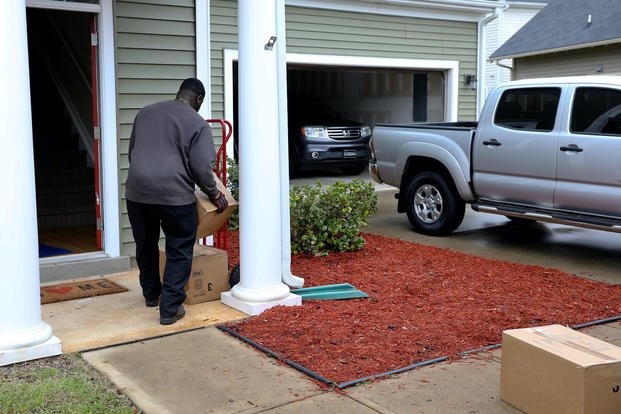A PCS is one of military life's most stressful and arduous chores. For relocating service members who choose to handle their move themselves, the government will pay you a certain amount via the Personally Procured Move, or PPM, program.
Formerly known as a DITY, or do-it-yourself move, PPMs typically allow military members to be reimbursed for up to 100% (formerly 95%) of what your moving job would have cost the government.
That means you tackle the costs and the work of packing and moving your household belongings yourself -- or handle hiring a commercial moving company yourself -- and then you receive payment later to compensate you for the expenses.
Two Types of Personally Procured Moves (PPMs)
As of 2023, there are two types of PPMs authorized by the Defense Department: Member-Elected PPMs and Actual-Cost PPMs.
Member-Elected Personally Procured Move (PPM)
A Member-Elected PPM is chosen or "elected" by the service member as their preferred method of relocating their household goods. In this most common type of PPM, the service member is reimbursed at 100% of what a moving company would've been paid by the DoD. Any money spent over that amount is an out-of-pocket cost, while any amount spent under it is income. That amount is calculated based on the government's contracted rate with the moving industry and the service member's household goods weight allowance.
You will likely be eligible for an operating allowance to defray upfront costs, like renting a truck. However, you will not receive full payment until after your move. It's important to keep in mind that it's only after applying for and being authorized for a PPM move that you can proceed.
Actual-Cost Personally Procured Move (PPM)
Unlike Member-Elected PPMs, the Actual-Cost PPM is ordered by the transportation office when a government-sourced move is not available in the required timeframe. Preapproval of the move and its costs is likely mandatory, and military members should work with their service branch transportation offices to learn requirements for this type of move, since they can vary.
Actual-Cost PPMs are reimbursed at the actual cost paid by the military member, even if it exceeds what the DoD would've paid a contracted mover. Service members must still stay under their authorized household goods weight, which varies by rank and years in service.
Who's Eligible for a Personally Procured Move (PPM)?
You're eligible for the PPM moving reimbursement program if you make a permanent change of station (PCS), temporary duty (TDY) or temporary additional duty (TAD) move.
You're also eligible if you separate, retire or move to or from government quarters under orders.
What Options Do I Have for a Personally Procured Move (PPM)?
If you opt for PPM, you have several choices:
- You may opt to use your own vehicle, or rent or borrow a vehicle.
- You may use portable moving and storage containers.
- You may ship belongings via services such as UPS and FedEx.
- You may use part or all of the program. If you make a partial PPM move (i.e., only shipping a certain amount of household goods), make sure you work out the details with your Personal Property Office (PPO) representative.
- You may space out your move over time if you wish. For example, you can rent a truck for a few days and move a few items at a time if that would work for your situation. If it's a long-distance move, you could rent two or more trucks and get help from friends and family.
Things You Should Know About a Personally Procured Move (PPM)
The physical work of moving is no joke, but it can be rewarding. Many military members see PPMs as a way to earn money -- in some cases, up to $10,000 or more -- for doing their own labor. However, you can also pay professionals to do some of the work, thereby earning you less profit, of course.
A do-it-yourself move also gives you greater control over your belongings, reducing the risk of items being lost or stolen. PPMs are a good option for any irreplaceable valuables you own, such as family heirlooms, photos and important documents.
You also have much more control over the timing of your move, and you are more able to spread out the process if desired.
Here are a few important things to keep in mind if you're considering a PPM:
- If you believe you may be moving, it's smart to do advance planning and research. But do not make any permanent decisions -- such as selling or buying a home -- until you have your actual orders in hand.
- For PPM reimbursement, the importance of certified empty and full-weight tickets cannot be overstated (details below). Without them, you could lose thousands of dollars.
- Payments above your actual moving costs may be taxable. Read IRS Publication 521 for more information.
- Temporary storage may be available. Check with your Personal Property Office (PPO).
- In case of loss or damage, claims usually are not paid unless they were due to circumstances beyond your control, such as an accident.
- Advanced operating allowances are authorized only to pay for rental trucks, packing materials and other miscellaneous expenses directly related to your move. An advance isn't given for an estimated weight of shipments.
- Use the Defense Personal Property System, or DPS, online system to upload your orders and create shipments.
- You can split up your total allowable weight into multiple shipments.
Related: 6 Military Move Discounts
Steps to Take for Your Personally Procured Move (PPM)
Are you ready to take the reins of your move? To take part in PPM, follow these steps:
- Take an inventory of everything you'll need to move. Can you handle all or part of it yourself? Can friends and family help? Can you hire professionals for part of the job, like packing? Will you need to make arrangements for pets?
- Factor in more time and planning if you must move during the peak moving season of May through August. For example, you may need to reserve a rental truck earlier due to high demand.
- Schedule an appointment with your Personal Property Office (PPO) to get details on the benefits and to apply for the program.
- Learn what qualifies as an authorized shipment. Find out exactly what you are responsible for.
- Get specific details about what the government will pay for, and any extra benefits and travel allowances you can receive. You may find that you qualify for more than you expected.
- Get packing tips from this checklist.
- Confirm your insurance coverage. Make sure you are up to date on your car and accident insurance. If you use a trailer, check your auto insurance policy to make sure you're covered. State laws regarding liability for accidents during a PPM vary, so if you're involved in an accident while performing a PPM, you should contact the legal office at the military installation nearest the accident site as soon as possible.
- Pick up your operating allowance from your local dispersing office.
- Ask for a military discount from truck rental firms and any other companies you contact. Don't be afraid to place companies in "competition" with each other by comparing prices and bargaining.
- Get receipts for all moving expenses. (Details in section below, "Authorized Expenses for Your PPM")
- When your vehicle (whether you own it or are renting) is ready, calculate the total weight of what you are moving. You should weigh your vehicle both fully loaded and unloaded. This is extremely important, as your PPM payment will be based on this weight ticket. (See section below, "How to Calculate Your Shipment Weight for Your PPM.")
- Make your move and submit your settlement. (See section below, "Documents to Include on Your PPM Claim.") Once you complete your actual move, you have 45 days to submit a claim for full payment of your PPM allowance.
Forms You May Need for a Personally Procured Move (PPM)
As always, check with your service branch transportation offices for specific and up-to-date requirements. These are some forms you might need:
- DD Form 2278: Application for Move and Counseling Checklist
- Certified empty weight ticket for each shipment
- Certified loaded weight ticket for each shipment
- Original DD Form 1351-2: Travel voucher or sub-voucher
- Copy of registration for your boat(s) and/or trailer(s), if applicable
How to Calculate Your Shipment Weight for Your PPM
- Empty weight = your vehicle with a full tank of gas, but with no drivers or passengers inside
- Loaded weight = your vehicle with a full tank of gas + all of your property loaded, but still with no drivers or passengers inside
- Loaded weight - empty weight = net weight of property
What to Include on Each Weight Ticket for Your PPM
Exactly what must be included on your weight tickets and where you must get them depends on your military service. These are some of the factors that likely need to be included:
- Your name and grade
- Name/location of scale
- Vehicle/trailer identification
- Date of weighing
- Weighmaster's signature
- Legible imprint of weight
Authorized Expenses for Your PPM
All costs associated with your move are not taxable and will be deducted from the allowance you receive from the move to determine your potential profit.
Only your profit will be taxed, so be sure to keep track of everything to maximize your profit.
Authorized PPM expenses could include:
- Rental truck/trailer
- Rental (not purchase) of moving equipment such as hand trucks and dollies
- Furniture pads and tie-downs
- Boxes/tape and packing material
- Hired labor
- Travel allowances under certain circumstances
- Gas and oil expense (but not an oil change)
- Highway tolls, weight tickets and any other transportation expense directly related to the PPM
Documents to Include on Your PPM Claim
Like so many other parts of a military move, exactly what you need to include in your PPM likely varies by military service. Those likely include:
- Empty and loaded weight tickets (two copies of each)
- DD Form 2278
- PPM certification (attach all receipts for moving expenses)
- PPM expense sheet
- Change-of-station order
- Advance operating allowance paperwork (if you are renting a truck or trailer)
- Vehicle/trailer rental contract (if you are renting a truck or trailer)
- Any other paperwork as advised by your Personal Property Office (PPO)
Keep Up-to-Date for Your Next PCS
Get the inside information from those who know. Get PCS help and all the news and benefits information you need delivered straight to your inbox. Subscribe to Military.com now.














